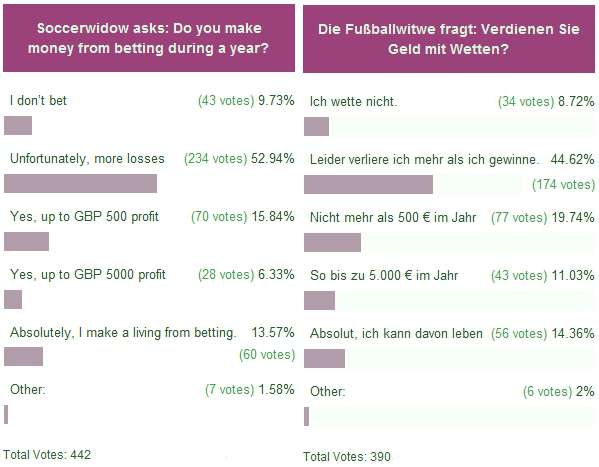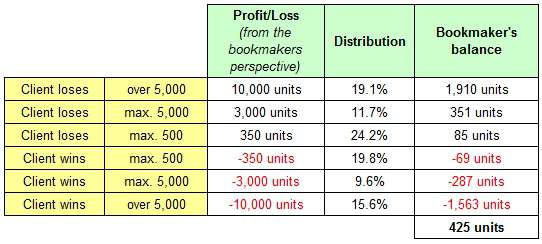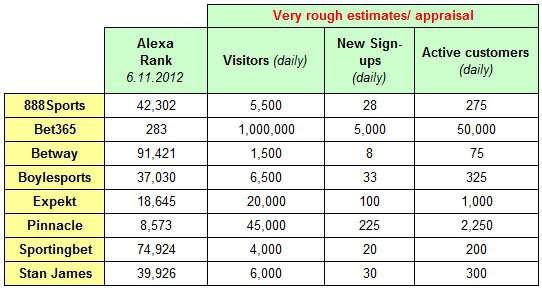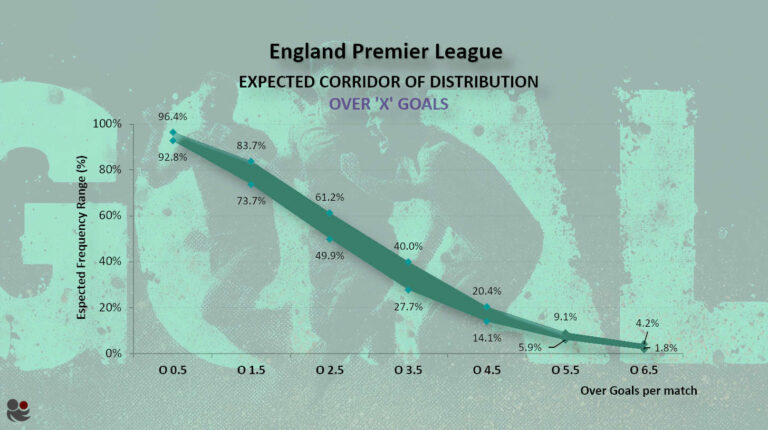
Poll_living_betting_combined_2012.11.04
Recently we received an email from a distressed reader who after a very short time scale (just 2 months!) employing a strategy based on our Home-Draw-Away article, found that without warning several bookmakers (e.g. Boylesport, Stan James, Expekt, Betway, 888Sport, Sportingbet) cancelled his accounts and literally barred him from their e-premises.
Other bookmakers didn’t close his accounts but effectively also ended their relationship by limiting his stakes to ridiculously small amounts such as 2 € per bet.
Our initial response was that bookmakers are free to choose their clients and accounts belonging to customers who do not satisfy their business model are subject to cancellation. This was half accepted by the reader who stated you can read similar suggestions throughout the Web without ever finding a clear explanation but he was insistent and what he really wanted to know from us was WHY?
Therefore, this article attempts to answer in detail the legitimate question as to why customers are banned by bookmakers or accounts are limited.
However, we cannot promise that our conclusions will be agreeable to everyone because sometimes it is better not to know WHY, as dreams are sometimes all too easily shattered by the truth.
Warning: If you prefer to cling on to aspirations of becoming very rich one day with sports betting then perhaps you should stop reading this article now!
Doubtless, life is more bearable if there is some hope of better fortune involved. The reasons why bookmakers close accounts are banal. Using simple logic to interpret the business approach of bookmakers, the bigger picture almost certainly conveys a straightforward message to the masses of people with gambling dreams. Unfortunately, the truth which evolves is contrary to the popular belief system of becoming rich from betting.
Soccerwidow’s survey results for the question “Do you make money with betting?”
This poll has been present on the Soccerwidow site for many months. Let us take a look at the current vote scores to discover whether readers admit to making money from betting:

So far (as per November 2012), the survey has accumulated a total of 832 votes. Although this is a fairly representative sample, we cannot claim any scientific significance as it has not been carried out under controlled conditions.
Unfortunately, the survey also has a design error. It contains the option, “I make a living from betting”, but fails to quantify voters’ winnings over and above £5,000 (English site) or 5,000 € (German site). Therefore, we have to accept that anyone regularly winning more than £5,000 or 5,000 € per annum had no other option but to tick, “I make a living from betting”. Of course although this is insufficient for survival in most European countries, our readership is worldwide and it may be that 5,000 currency units is enough to live on in some countries.
Interpretation survey results for the question “Do you make money with betting?”
Nevertheless, the number of responses for “I make a living from betting” is quite eye-opening. Around 14% (13.57% English site, 14.36% German site: an independent perspective as hardly any visitors read both sites) indicate that they “make a living from betting”, or that they are winning more than £5,000/5,000 € per annum.
A common belief is that the percentage of successful gamblers is only 1-2% of the entire betting industry’s customer pool. This may be a misconception as our poll result gives the impression that the number of successful gamblers is actually ten times higher than generally assumed! Of course, in making this assumption we are taking for granted that people responded honestly with their vote.
Although our survey results may be skewed and therefore questionable, if this number reflects just a little of the truth, the financial consequences for bookmakers must be a real headache!
To translate the survey into numbers, we have prepared a very rough simulation of bookmakers’ profits/losses based on the poll votes:

The above figures are all rough estimates of the potential profits/losses bookmakers may face from individual customer clusters, assuming our poll reflects the true distribution.
In order to derive rules for the distribution we eliminated the answers “I do not bet” and “Other “, and for the distribution of losing clients we assumed a similar distribution as for the winners. The translation of the survey results into understandable figures is not so complicated, but a detailed explanation is beyond the scope of this article.
Of course, we reiterate that the main assumption is that our poll results have produced a representative picture of the market.
With this in mind, looking at the table we see around 19% of bookmakers’ customers regularly losing more than 5,000 currency units per year, while 15.6% of customers win more than 5,000 units. This is quite a tight operating margin for the bookmakers!
There is no need to have a degree in business studies to understand that it must be in every bookmaker’s interest to increase the number of customers in the first row (the big losers) and to reduce the customer numbers in the last row (the more professional, successful players).
Of course, it should be expected that the quality of customers is not equally distributed between the bookmakers. One bookmaker will have more “good” (profitable) clients than the next.
Despite the potential shortcomings of our survey, this reasoning somehow makes sense. There are more and more well educated people around and growing numbers who see sports betting not only as pure gambling, but as a mathematical challenge, for which there is a solution. With explosive growth the Internet has provided a mountain of sites available to the public providing historical data and statistics, and many households own at least one computer. There are also various calculation tools accessible, tipster services, software applications, odds calculation tutorials, etc.
The ultimate task the bookmaker has is weeding out the “risky” (successful) players who are a liability and retaining the “good” (profitable) customers.
You may have seen the movie “21” where successful casino players are targeted and banned from winning. The film may be pure fantasy but the reality is that betting firms eliminate you for being too successful, or for even showing you have the potential to succeed against them.
Risk Diversification
Any avid reader of this blog may already have stumbled across the expression “spreading the risk” a good number of times. The more bets included in a portfolio, the more risk is spread to better effect, and consequently the deviation from statistically experienced distributions is smaller, leading to more consistent success.
The same applies of course for bookmakers. The more customers, the more bets, the greater the diversification and spread, the smaller the variance, the stronger their betting book.
The question now is how big is a bookmaker’s betting portfolio? How far do they spread their risks?
Regrettably, bookmakers do not report their customer numbers and revenues, at least not to the public. Again, we must rely on estimates, and for this we are going to use the Alexa rank of various bookmaker Web sites.
Alexa is a service which puts all Web sites worldwide into a ranking order. The more popular a Web site, the smaller the Alexa rank. Today, Google.com is the most popular site in the world according to Alexa with a ranking of 1, followed by Facebook in 2nd place. Wikipedia ranks number 6 in the list. Betfair.com is found at 1,097, and Soccerwidow is at position 243,159.
Alexa seems to stop counting at 30 million and Web sites with a worse position than this display “n/a” (not applicable) in the Alexa toolbar.
The Alexa rank is not only an indication of popularity, but it can also be used to estimate (roughly) how many visits per day a site attracts.
For example, Soccerwidow’s ranking corresponds to around 500 visitors per day (Alexa rank 200,000 to 250,000). A few weeks ago, our Alexa rank dropped just for a couple of days to 190,000, but without any change in our visitor numbers. This shows that there are many sites constantly jostling for position, and no ranking algorithm is perfect.
Nevertheless, an Alexa rank of 100,000 means around 1,500 visitors per day, and an Alexa rank of 50,000 approximates to 5,000 daily visitors. Using these guidelines we can make a very rough estimate of the number of visitors online bookmakers receive:

With these rough estimates it is now possible to estimate the number of new customer sign-ups the bookmaker receives on average per day as well as the number of active customers.
Don’t forget, all these calculations are highly erroneous because firstly we are basing them on Alexa ranking and visitor estimates, and secondly, both new customer sign-ups and the number of active customers depend on a great variety of factors, such as the Web site design, its marketing, free bet offers, attractiveness of odds, presence on odds checking sites, etc.
We have therefore assumed in the above table that from the daily flow of visitors each online bookmaker receives, around 0.5% register as a new customer and around 5% of the daily visitors are active (i.e. place bets, play online casino, etc). The remaining 94.5% of visitors are passive, accessing the bookmaker’s site to check odds, watch live sports, read their blog, etc. This figure also includes those users who ‘bounce’ within a short period of accessing the site.
Of course, figures differ from bookmaker to bookmaker but nevertheless, the numbers provide a good idea of the size of the bookmaker for comparison purposes.
Again, just by applying common sense, it should be obvious to everybody that a bookmaker like Betway, for example, which sees around 1,500 visitors a day and probably averages 75 active clients daily, is facing a completely different set of challenges and risks than a giant like Bet365 which, accommodates daily around 1 million visitors with perhaps 50,000 active customers in all kinds of markets.
The lower the number of active customers, the less diversified the risk, the more restrictive risk management the bookmaker must make in order to retain solvency margins and avoid bankruptcy.
Hence, just by looking at the Alexa rank you should now be able to estimate the size of a bookmaker and judge how quickly they may have to denounce your account if you show signs of becoming successful at their expense.
If you read a few forums, you will find that Betway, Sportingbet and Stan James are pretty quick in closing accounts (Alexa ranking higher than 35,000), and that the slightest sign of professional gambling or arbitrage will cause dismissal. Expekt is a little more generous (Alexa ranking between 15,000 and 35,000), with fewer blogs seeming to suggest they close accounts quickly, whilst from the largest worldwide online bookmaker, Bet365, we have seen mixed reports.
Risk Management
This article has identified two important reasons why it is necessary for bookmakers to manage their risks with customers:
- There are in fact perhaps more professional and successful players than most people think who win larger amounts than the bookmakers are comfortable with.
- Especially the smaller bookmakers face the problem that their client portfolios are not large enough to be sufficiently diversified, and thus the risk of being severely damaged by a professional player is disproportionately high.
Thus, as with all professional companies, bookmakers develop guidelines and profiles on what type of customers they want and those they would rather avoid. These policies are based on strategic decisions and internal cost-benefit analysis, and they certainly differ from company to company.
The main belief of gamblers is that customers are screened especially if they operate surebets and/or arbitrage strategies. However, this is surely not the only criteria. There may be licensing issues in a certain region/country or perhaps a certain region is known for better educated customers than another, and therefore it is a higher risk for the bookmaker.
Therefore, the real reason for dismissal from a bookmaker may not necessarily lie on personal betting behaviour, and sadly it is probably enough to fall into a specific risk group.
Possible indicators for bookmakers that they are dealing with a professional punter:
- Time of betting – Professional gamblers are organized. They calculate their portfolio in due time before the game and bets are likely to be placed at certain times, for example, on the evening before kick-off. The bookmaker is aware of your time zone.
- Number of bets – Professional players diversify their risk and bet on a portfolio (placing many bets).
- Bet size – Professional punters have a business plan. They do not experiment with their bank. For example, odd stake amounts such as £24.43 indicate an arbitrage or matched bettor.
- Special offers / free bets – Professional players do not take every special offer or free bet. They will only take it if it fits into their business plan.
- Specialization – Professionals are characterized by planned action, specialization and a systematic approach. Some professionals will exclusively bet on value. Others specialize on outsiders markets, etc.
- Profitability – Professional gamblers take more money out of the bookmaker than they pay in during their life as a customer. This is of course not profitable for the bookmaker. But, how high the reporting threshold is probably varies from bookmaker to bookmaker.
- User behavior – Professional punters do not hang around. For example, they are not interested in watching live matches, a few horse races or a tennis match between their bets. They find their way around the bookmaker’s site quickly. They log in, locate their bet(s), place the stakes, and then move on to the next bookmaker.
There are certainly many more indicators through which a bookmaker may filter professional bettors. Just try and imagine being a bookmaker yourself and what precautions you would take to detect a potentially damaging customer as quick as possible in order to exclude them from your business.
Of course, this rigid style of investigation may catch out a few players who are not professionals (or perhaps not yet), but it is better for the bookmaker’s risk management to employ, “If in doubt, kick him out”, rather than run the risk of losing money.
Whenever we are asked what to do when you are unsure whether to place a certain bet or not, we always answer: If in doubt, do not bet. A bet not placed cannot lose! This also applies to bookmakers. If in doubt, better off without the potential liability. Bookmakers are not in business to speculate or to take uncalculated risks.
It is also sometimes discussed that there is an electronic “warning system”, allowing bookmakers to receive information indicating the possibility of a high risk client. For example, iesnare is such a system. However, removing the cookies from your computer will probably thwart this ‘big-brother’ threat.
The simple fact is that bookmakers will do anything to rid themselves of non-profitable customers. The goal of fortune seekers to gain long-term winning bets, or even make a living from betting, is absolutely contrary to the business plan of bookmakers.
However, what specific criteria individual bookmakers use to manage their book of risk and make decisions, is open to speculation. To publish and disclose such information would be the downfall of their risk management mechanism.
Is the Picture Clearer?
Hopefully, having read this article you will now understand that bookmakers MUST manage their risk to stay in business!
You should now know WHY bookmakers ban customers or limit accounts. It may not be a satisfactory answer because it puts the dream of “getting rich from sports betting” in an even more remote and difficult place to reach.
Once again we reiterate that getting rich quick from sports betting is illusory.
It is open warfare with the bookmakers and before you jump out of the trenches and cross no-man’s-land to fight them you had better understand odds calculation, be able to compose a betting portfolio, have several bookmaker accounts and develop a good strategy, etc. Oh, and you have to know the market like the back of your hand, preferably even better. If you are weak in any one of these areas, you are dead as soon as you raise your head above the parapet.
And whilst you spend many long, hard working hours (probably even years) slowly developing into a professional bettor, at the same time, you are becoming an enemy of the bookmakers.
Perhaps it is better to call off the war and do something more constructive with your time? Or instead of betting yourself, why not write articles about betting? Please contact us if you fancy publishing for Soccerwidow. Paper exercises also increase adrenaline levels. This we say from experience… 😉







William Hill allowed me to place a bet of almost 5000 euros, but ticket had eight events on it, mostly on favourites on first round of Wimbledon 2015. Check it out, I have a screenshot: http://i.imgur.com/UuG6uRA.png
But yes, a lot of european bookmakers limit their customers if they are winning regularly..
Well done.
That’s precisely the kind of bet that will get the ‘risk managers’ salivating and allow you a year or two of professional punting.
🙂
I am betting for 10 years. I was also giving picks. My clients all restricted or banned from nearly all Euro bookies. Ladbrokes, Expekt, Bwin, Bet365, WillHill, Mybet all is limiting users or banning when they show risky winning user behaviors.
I really advice you all to pass Asian Bookies. Sbobet, Ibcbet, Singbet, ISNbet and of course glorious PinnacleSports. These 5 bookies are not limiting users they have great limits. Best one is PinnacleSports of course then second best is Sbobet. I really cannot understand even you are losing bettor why you prefer using Euro bookies which give less odds. Also whenever you start winning these bookies will close your accounts so please do not bet there. They are freuds. Because they only accept you if you are a losing bettor. They do not deserve winning money. Asian Bookies are trustable I use them for 5 years and had no problems. Only SinBet sometimes void bets without showing reason but other 4 bookies are nearly perfect.
Do not use Euro bookies use Asian ones.
@Ozan
I use European bookies because the best way to make money from soccer is by betting on long term markets.
Bookies will happily lay bets on such markets.
Not much point in learning how to make money from markets you can’t get laid on.
Sure you can bet what you like on the Asian markets …but of course they are so efficient that they are hard to beat.
Cheers